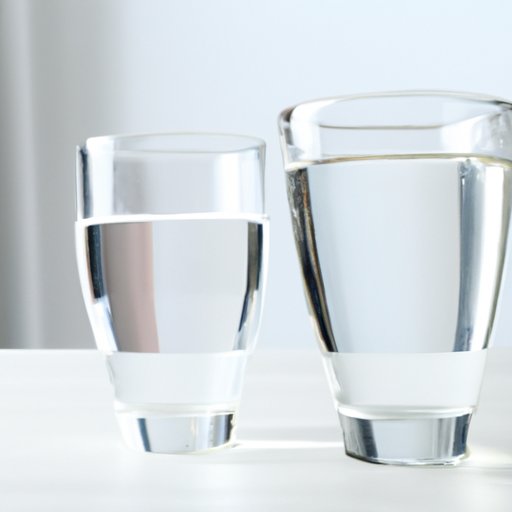
Introduction
It’s a question that every survivalist has pondered at some point: how long can you survive with only water? Though it may seem like a macabre or unlikely scenario, the fact is that many people find themselves in situations where access to food is limited or nonexistent. In this article, we’ll explore the science of water consumption and its impact on survival, examine the stories of those who have survived without food but with water, delve into the effects of a water-only diet on the body, and offer guidance on how to properly hydrate in extreme circumstances. We’ll also provide a survival guide with practical tips for obtaining food and water in emergency situations.
The Science of Water Consumption: How Long Can You Live with Only Water?
Water is essential to life, with the majority of the human body consisting of water. The body needs water to regulate temperature, transport nutrients and oxygen, and facilitate the elimination of waste products. However, the body can survive only a short time without water. On average, a human can survive only three to five days without water. However, this timeline is influenced by various factors.
Dehydration is the process by which the body loses more water than it consumes. The symptoms of dehydration vary depending on its severity. In mild cases, it may result in thirst, dry mouth, and dark yellow urine. Although unpleasant, these symptoms can be remedied by consuming more water.
Moderate dehydration can cause symptoms like fatigue, dizziness, headaches, and dry skin. Confusion, irritability, and decreased urine output can also occur. Severe dehydration may cause delirium, hallucination, unconsciousness, and eventually death.
Survival experts suggest that a person stranded in the wilderness could survive for approximately three days without access to water in moderate temperatures. In hot temperatures, survival time decreases to around one day.
Breaking Records: The Stories of People Who Survived Without Food But Had Water
Though the body needs food for energy and a range of vital nutrients, it is possible to survive without food for an extended period of time. For instance, the body can use its fat stores and protein to produce energy.
One of the most famous examples of survival without food was the case of Mahatma Gandhi. The Indian leader went without food for 21 days while imprisoned in a British jail, relying solely on water. Other examples include surviving on water during religious fasts and surviving in extreme wilderness situations without food.
The largest recorded number of days an individual survived without food is 382 days. This occurred in 1973 when a Scottish man named Angus Barbieri fasted for over a year in a hospital setting. He was able to survive for such a long time thanks to the careful management of his nutritional and fluid intake by the medical team in charge of his case.
The Water-Only Diet: What Happens to Your Body When You Don’t Eat?
While it’s possible to survive without food for a period, the human body needs a steady stream of nutrients to maintain optimal health. A lack of food can lead to a wide range of negative consequences and create serious long-term health problems.
When the body is deprived of food, it undergoes several stages of starvation. These stages include the consumption of glycogen stores, the breakdown of fatty acids, and the consumption of protein from the body’s muscles. The levels of glucose and ketones in the blood, as well as the level of insulin, change in response to the body’s metabolic processes.
Prolonged starvation can cause significant damage to various organs in the body, including the heart, liver, and kidneys. Individuals who survive long periods with only water may experience a range of health issues such as the development of gallstones, significant weight loss, and the development of nutrient deficiencies.
How to Properly Hydrate in Extreme Circumstances
In extreme conditions, the body may require more water than usual to maintain proper hydration. For example, in hot weather conditions, the body loses water through sweating at an accelerated rate. Water intake should increase in proportion to the loss, particularly if there are no alternative sources of hydration available.
Survivors in extreme conditions must take care when seeking out water sources to avoid potential contaminants such as bacteria, viruses, and other harmful organisms. If a person becomes dehydrated, he or she may need to consult a medical professional to determine the best course of treatment.
Survival Guide: Tips for Staying Alive with Limited Access to Food and Water
In addition to proper hydration, there are many strategies to maximize survival time when access to food and water is limited.
One of the most important strategies is to stay calm and avoid wasting valuable energy and body fluids. It’s equally important to stay warm and dry to prevent hypothermia and conserve body fluids. Energy conservation is key, so physical activity should be limited to only essential tasks.
In terms of obtaining water, it is important to use all available resources – including collecting rainwater or dew and finding natural sources like streams or springs. One could also use tree trunks or roots to collect water naturally produced from local vegetation. Food acquisition may involve hunting, fishing, gathering, or foraging.
Conclusion
The human body requires adequate hydration and nutrition to function properly. However, it is possible for individuals to survive with a limited supply of water and no food for a short time under favorable conditions. By understanding the science behind dehydration and starvation, survivors are better equipped to make the right decisions when access to resources is limited. In extreme circumstances, it is crucial to remember the importance of keeping a positive outlook while staying calm and focused. With the right mindset and strategies in place, it is possible to survive with only water for longer than one might have initially thought.




